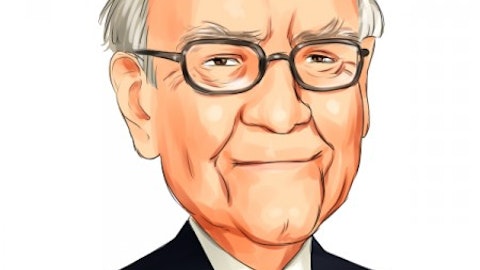2015 was not a great year for hedge funds in terms of performance, but it wasn’t too bad either. The hedge fund industry as a whole lost less than 1% last year, and 2016 is believed to offer the best investment environment for hedge funds, although they haven’t proven it so far. Increased volatility and lower valuations tend to signal more investment opportunities on both the buy and sell sides for highly-talented hedged stock pickers. However, the hedge fund industry is taking a hit from the media yet again for its disappointing performance in 2016. Reportedly, the industry is down by approximately 3% in January, though it should be noted that monthly samples are too small to glean much useful data from and most investment firms are long term-oriented players. Having said that, the following article will discuss four filings submitted with the SEC by several highly successful money managers, including Warren Buffett and Steven Cohen, among others.
Through extensive research, we determined that imitating some of the picks of hedge funds and other institutional investors can help generate market-beating returns over the long run. The key is to focus on the small-cap picks of these investors, since they are usually less followed by the broader market and are less price-efficient. Our backtests that covered the period between 1999 and 2012, showed that following the 15 most popular small-caps among hedge funds can help a retail investor beat the market by an average of 95 basis points per month (see more details here).
According to the latest Form 4 filing from Berkshire Hathaway, the holding company has purchased another 1.69 million shares of Phillips 66 (NYSE:PSX) this week, at prices ranging from $76.79 to $78.60 per share, boosting its overall holding to 73.98 million shares. The Oracle of Omaha has snapped up an additional 2.54 million shares since the last time that the Insider Monkey team covered Buffett’s daily purchases of Phillips’ stock (read more details). The freshly-upped stake accounts for 13.87% of the oil refiner’s total shares. The stock of the energy manufacturing and logistics company is 2% in the red so far in 2016 but is up by nearly 5% over the past 12 months.
The question that most investors might ask is why Buffett considers Phillips 66 (NYSE:PSX) to be an attractive investment opportunity. In our previous articles on the oil refiner, we argued that the broadening U.S. 3:2:1 crack spread (an indicator for refining margins) represents the main reason for investing in the company. However, the company’s refining segment suffered a blow from lower realized margins in the fourth quarter due to a decline in global market cracks. So there is definitely something else that likely explains Buffett’s bullishness. Phillips 66 had cash and cash equivalents amounting to $3.1 billion, and $8.9 million in debt at the end of 2015, so the company’s net-debt-to-capital ratio of 20% is a strong reason for investing in the company. The refiner’s quarterly dividend of $0.56 per share can serve as another strong reason for investing in the stock, as it offers a current dividend yield of 2.83%. The stock trades at a forward price-to-earnings multiple of 11.49, which is slightly higher than depressed ratio of 9.1 for the oil and gas refining and marketing industry. Hence, Phillips 66 appears to represent a Buffett-style income stock, which might serve as a safe bet on the crude oil industry rebound. Iridian Asset Management, founded by David Cohen and Harold Levy, owns 5.22 million shares of Phillips 66 (NYSE:PSX) as of September 30.
Follow Warren Buffett's Berkshire Hathaway
Let’s head to the next two pages of this article, where we discuss three separate filings submitted with the SEC.
In a Schedule 13G filing, Point72 Asset Management L.P. reported owning 6.88 million shares of Rice Energy Inc. (NYSE:RICE), which constitute 5.0% of the company’s outstanding shares. Steven Cohen’s family office owned 1.23 million shares of the independent natural gas and oil company at the end of September. The company engages in the exploration and development of natural gas, oil and NGL properties in the Appalachian Basin, and operates in two businesses: exploration and production, and midstream. Numerous hedge fund managers have been seeking strong and safe bets on the crude oil industry, mainly focusing on companies which have large piles of cash, cost advantages, and capacity to deal with sizable debt loads. Rice Energy Inc. (NYSE:RICE)’s long-term debt totaled $1.52 billion at the end of September, while its cash reached $216.08 million. However, the company has $524.6 million available under its Senior Secured Revolving Credit Facility as of September 30, so Rice Energy is well-positioned to tackle the current environment.
Meanwhile, the company generated total operating revenue of $366.06 million for the nine months that ended September 30, an increase of $104.5 million year-over-year, mainly due to an increase in gathering, compression, and water service revenue. The increase in natural gas, oil and NGL production, mainly as a result of an increase in drilling and completion activity in Washington County, Pennsylvania and Belmont County, Ohio, also positively impacted the operating revenue figure. A total of 23 hedge funds monitored by Insider Monkey were invested in Rice Energy at the end of the third quarter, having accumulated 22% of the company’s total shares. Ken Griffin’s Citadel Advisors LLC was heavily invested in Rice Energy Inc. (NYSE:RICE) at the end of the third quarter, holding 11.36 million shares as of September 30.
Follow Steven A. Cohen's Point72 Asset Management
As disclosed by a separate 13G filing, Stephen Feinberg’s Cerberus Capital Management L.P. acquired a new stake of 578,781 shares in Hooker Furniture Corporation (NASDAQ:HOFT), which represents 5.4% of the company’s outstanding shares. The home furnishings marketing, design and logistics company has operated in a vibrant and improving business environment in recent years, thanks to the recovery of the housing market and housing-related industries. Hooker Furniture reported net sales of $186.43 million for the 39 weeks that ended November 1, up from $179.45 million reported for the same period of the prior year. Most importantly, the company’s operating margin increased to 9.5% from 7.0% year-over-year. Hooker Furniture Corporation (NASDAQ:HOFT)’s shares have advanced by over 50% in the last year. For that reason, the stock trades at a rather expensive forward P/E multiple of 17.43 (relative to the broader market, as the forward P/E ratio for the S&P 500 Index stands at 15.89). However, the average forward P/E for home improvement retailers equals 19.0, so the stock might still have more room to run given that it does not appeared to be overvalued amongst its peers. Neil Chriss’ Hutchin Hill Capital acquired an 11,400-share stake in Hooker Furniture Corporation (NASDAQ:HOFT) during the July-to-September period.
Follow Stephen A. Feinberg's Cerberus Capital Management
According to a Schedule 13D filing, Jeffrey Bronchick’s Cove Street Capital LLC currently owns 3.17 million shares of Forestar Group Inc. (NYSE:FOR), which make up 9.4% of the company’s total shares. This compares to the stake of 2.60 million shares revealed by the fund’s 13F for the third quarter. In February 2015, CSC and another shareholder of Forestar sealed an agreement with the real estate and oil and gas company, under which one incumbent director stepped down and two new directors were appointed to the company’s Board. At the same time, CSC and the other shareholder agreed on certain customary standstill provisions, which expired on February 1, 2016. As a result, CSC intends to work with Forestar Group Inc. (NYSE:FOR)’s management and the Board to continue enhancing shareholder value. The company conducts its business operations through three segments: real estate, oil and gas, and other natural resources.
Forestar’s revenue for the nine months that ended September 30 totaled $148.40 million, down from $226.46 million reported for the same period of the prior year. The company experienced negative top-line growth across all of its business segments during the first nine months of 2015. Nevertheless, Forestar appears to be financially healthy, considering its debt of $435.30 million, cash of $92.64 million, and net unused borrowing capacity of $283.82 million as of the end of the third quarter. The shares of Forestar are down by 37% over the past 12 months, after having lost nearly 19% in 2016 alone. Just recently, Clint Carlson of Carlson Capital reported ownership of 2.89 million shares of Forestar Group Inc. (NYSE:FOR), which account for 8.61% of the company’s shares.
Follow Jeffrey Bronchick's Cove Street Capital
Disclosure: None



